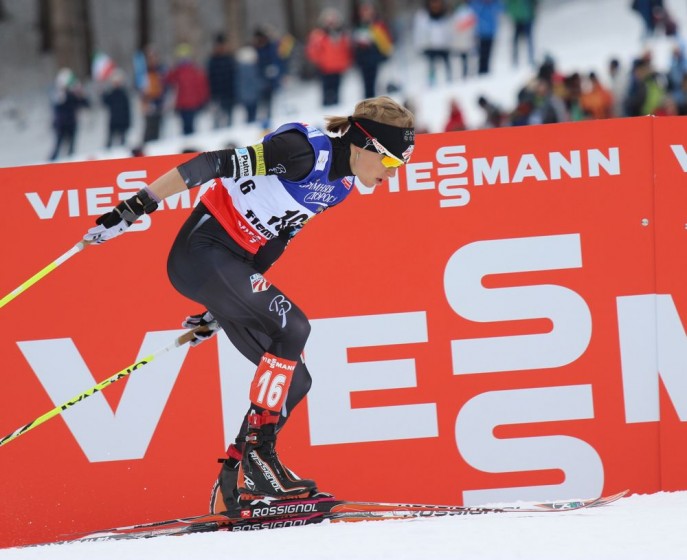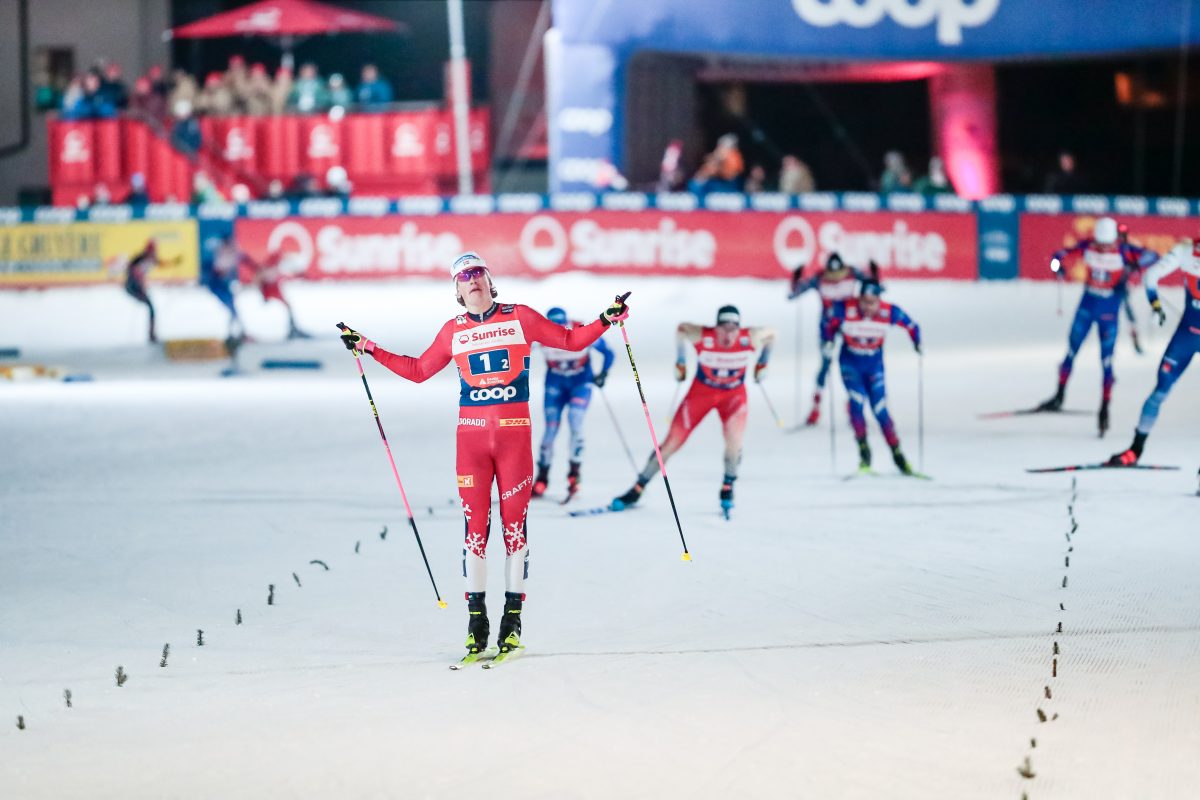
FasterSkier’s coverage of the 2013 FIS Nordic World Ski Championships in Val di Fiemme, Italy, is brought to you by the generous support of Fischer Sports.
VAL DI FIEMME, Italy — For the second day of the 2013 Nordic Ski World Championships, the 15 and 30 k skiathlons were not what the Americans were hoping for on Saturday. It had nothing to do with equipment this time, but through less than optimal outcome the team’s collective outlook was on the upswing after racing concluded. Liz Stephen posted the only top-20 for the team, but she and several Americans found reasons to be positive about certain bright spots they think bode well for upcoming distance events in Val di Fiemme.
“On the whole it was not spectacular, but it wasn’t without shining moments,” Said U.S. Ski Team women’s coach Matt Whitcomb. “It’s less than we’re looking to do and I’m certainly not disappointed, but I’m not going to tell you I’m ecstatic about the day.”
Stephen’s shining moment came in the second half of her race, in which she posted the seventh-fasted leg time by doing what she’s best known for: attacking difficult climbs. Many women went out too hard in the begining and had nothing left for the second half, but Stephen made sure to leave enough energy in the tank for her stronger discipline.
“If you give it all in the classic the skate doesn’t go so well, and this course is really hard,” Stephen said. “I wanted to make sure I didn’t blow up on the classic because I know skating’s a little easier and better for me these days anyways.”
Specifically, her plan was to ski into Val di Fiemme’s murderous hills — she eased off at the bottom in order to have enough spring to power over the top. oOn the whole Stephen said she executed this well.
“The skate felt great. I’ve been having trouble with the energy to push over the tops of hills, so my strategy was to take it easy at the bottom so I could really hurt people on the top,” she said. “I think I did that the best I could today, and I’m exciting for the week to come.”
The feeling left her encouraged that the results she wants could be on their way soon. At best Stephen hopes for a top five at World Championships, but “If I got top-10 I would be over the moon,” she said.
Sadie Bjornsen and Ida Sargent were 37th and 38th, respectively, and Holly Brooks was 49th. They were similarly dissatisfied with the end result, but had positive pieces to take away from the effort.
Bjornsen took her race out “a little bit harder than I expected,” and moved from classic to skate skis with less energy left than she would have liked, but by the end she found second wind.
“The fourth leg came together as I got more into the rhythm, so I kind of wished the race was a little bit longer today, I’m surprised to say,” Bjornsen said. “I was feeling quite good for the first time in the race.”
Mass starts at World Championships are particularly chaotic, and Bjornsen struggled initially to find her own pace in the frantic group.
“I got blocked out pretty bad at the beginning and it’s quite hard to come back to the front,” she said. “That doesn’t make it your own race. You’re going off people around you and that’s definitely the challenge of mass start racing. Last year I had such a good start I didn’t have that big up and down, so today I had to find a way to recover from that which, you know, is a lesson itself.”
While Bjornsen’s strong half was in skating, Sargent felt best in classic. She was 27th at the exchange before being held back by stomach cramps in the second leg, but she was ‘psyched’ to ski well in the beginning.
“I was bib 49 so I started far back there, but I was able to move up pretty well without going too hard, too quickly,” she said. “It was fast but I did my own thing and remembered it was 15 k.
Sargent didn’t say she had specific expectations for the race, but was happier with the skiathlon than she had been with the classic sprint on Thursday.
“I was just trying to see how the body felt and was hoping I’d have better skis than the day before,” she said. “That happened; I had great skis. I still have improvements to make in distance but it’s great to be here.”
The top three American women found reasons for optimism moving forward, and Whitcomb thinks the cobwebs may finally have worked themselves out now.
“I think it’ll take a race to get things going for some people, so I’m really looking forward to the 10 k skate,” he said.
Brooks, who finished 49th and was just over a minute behind Sargent, is more of a question mark. She had hoped to erase memories of bad skiathlons past at World Championships, but her body was simply not responsive on Saturday.
“I was really hoping to break that trend today and I went out and my body just didn’t respond,” she said. “I’d ask it to do something and it just didn’t want to.”
Searching for an explanation, Brooks thought for the second time this year that perhaps she’s done too much racing.
“I don’t really know,” she said. “I’m hoping I get to start another race here at the championships to put a better memory in my mind, but we’ll have to wait and see what the coaches have in mind.”
Freeman, Hoffman Finish in the 40s, Elliott Look For Better Things To Come
For the U.S. men that competed in the 30 k skiathlon the opening distance race was less than stellar. Kris Freeman and Noah Hoffman were 40th and 42nd, respectively, over 2:30 back from the leaders when they crossed the finish line. Freeman made no excuses; his energy just wasn’t there.
“I can always gauge how the race is going to go as the race goes, I only have so much to burn, and I burned a little too much in the classic race,” he said. “By the time I got to skating the legs were a little wobbly and I didn’t have it in the skate portion.”
On a course as challenging as Val di Fiemme’s it was important to maintain enough energy to get through it, and “my energy lasted about 20 k,” Freeman said.
It was a better finish than he had in Davos last weekend but was certainly not the result he wants. “At this stage of the game I’m looking for a top result and this clearly wasn’t it,” he said. “I’m looking forward to the 50 k classic. I’ve been struggling to find my touch skating this year and it showed today.”
Hoffman was at a loss to explain what he characterized as a disappointing race. He shot to the front in the first kilometer, as he has done in several mass starts this year, in order to avoid the variable pacing of the back of the pack — “where I am generally most comfortable,” he wrote on his blog.
Hoffman skied with large group of leaders through the first half of the race, but with the switch to skate skis he “blew up,” and lost contact. Freeman overtook him, and when Hoffman finished there were no other skiers around him.
“I am not sure why my energy and legs weren’t as good as they have been,” he said. “I am going to focus on full energy for the next races by forcing myself to take naps and get to bed early in the coming days. I believe I can be better the rest of the championships.”
Tad Elliott finished out the American showing in 52nd, 4:27 off the Dario Cologna’s winning time. Though his placing doesn’t reflect it, Elliott thought the second half of the 30 k was one of the best skate days he’s had all season.
“It’s the best I’ve felt all year, I don’t know if the result shows that, but I felt good,” he said after finishing. “I’ll just be skating from here on, so for the 15 k skate hopefully I’ll be ready.”
Elliott’s skate split was only the 47th-ranked back half, but men’s coach Jason Cork pointed out that the number doesn’t tell the whole story.
“It’s kind of hard; you get gapped a bit and it’s really hard to move up from there,” Cork said. “He’s looking forward to the 15 k for sure, so we’re stoked about that.”
Elliott got a bit unlucky early in the race with a tangle in the pack but he wasn’t upset by it. “It’s chaotic. I think dudes are just a little nervous, it’s world champs,” he said. “I just got tangled but that’s just the first kilometer. Some guys make it work.”
The tangle actually hurt Elliott’s back slightly, but he dismissed it as a minor side effect of mass start racing. He focused on the fact that he felt good and that his skis and wax worked well.
“It’s nice to finally feel healthy and have everything there,” he said. “You maybe saw with all the USST so far, we kind of got the cobwebs out.”
— Alex Matthews contributed reporting.
Audrey Mangan
Audrey Mangan (@audreymangan) is an Associate Editor at FasterSkier and lives in Colorado. She learned to love skiing at home in Western New York.



